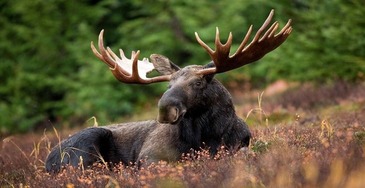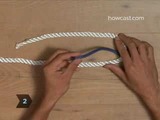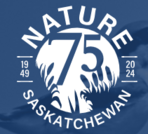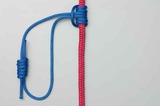
An overview of how the Tipi got its shape.
- Subject:
- Practical & Applied Arts
- Wildlife Management
- Material Type:
- Open Access Asset
- Author:
- Royal Saskatchewan Museum
- Date Added:
- 06/25/2024

This collection houses assets (or resources) from Saskatchewan Distance Learning Wildlife & Habitat Studies 10 course.

An overview of how the Tipi got its shape.

If you are a Canadian, you reside on the ancestral territory of an Indigenous nation. Fostering a healthy relationship that is reciprocal with that Indigenous nation is super important. A Land Acknowledgement is a small way for you to acknowledge oneself and their relationship to the land and to the Indigenous peoples who care for it.
Indigenous peoples roll their eyes at most contemporary Land Acknowledgements. So I have created a 7 minutes 4 part guide to creating an effective and personalized Land Acknowledgement.

Underwater fishing lure footage and how different types of fishing lures work. There are a ton of kinds of fishing lures and it's easy for a beginner to be confused with all of the options. How do fishing lures work and what are all these different baits for? Here we review many common types / categories of fishing lures and plastic baits including crankbaits, spinnerbaits, chatterbaits, jigs, and more to explain how a fishing lure works. We also test their action with underwater camera video footage of how these lures work to catch fish.

So you want to string up a clothesline six feet long, but all you've got is four feet of rope and three feet of shoelace? No problem.
Step 1: Form bend
Fold one end of the thicker rope back on itself to form a bend (or "bight") that looks like an "U" shaped, tipped on its left side.
Step 2: Slip thin rope through bight
Slip one end of the thinner rope through the bight from behind.
Step 3: Wrap thin rope around arms
Now wrap the end of the thinner rope around both arms of the bight, crossing over the short arm first (and staying below the trailing end of thin rope).
Step 4: Pass thin rope
Bringing the end of the thinner rope around to the front, pass it between itself and the short arm.
Step 5: Tighten knot
Tighten the knot by pulling both ends of the thinner rope.

Survival SERE instructor Jessie Krebs shows how to tie a Canadian Jam knot, aka an Arbor knot. Very useful in survival scenarios.

This site allows you to quickly and easily purchase hunting, angling and trapping licences, review your previous licence purchases, apply for the Big Game Draw, review your Big Game Draw applications and pool status, and to view or update your account information.

Indigenous Saskatchewan Encyclopedia
Over 200 entries about Saskatchewan's Indigenous history for you to discover

Indigenous habitation dates back to 10,000 years ago. By the 1600's, the A’aninin (Gros Ventre) followed the bison herds in this area. More recently, the Nakoda (Assiniboine), Nehiyawak (Plains Cree), Niitsitapi (Blackfoot), Dakota and Lakota (Sioux) also inhabited this grassland area on a seasonal basis

A school at the Sturgeon Lake First Nation in Saskatchewan has a land-based education program for its students.
The program is aimed at getting back the old Nehiyaw traditions that were taken from the community by colonization and residential schools.

Leave No Trace is about respecting and caring for wildlands, doing your part to protect our limited resources and future recreation opportunities.
Many of us have taken a pine cone or rock, veered off the trail to dodge mud puddles, gotten too close to wildlife or tossed an apple core into the woods. While these actions may seem harmless at the time, until we learn to reduce our impact, the quality of our outdoor experiences and the recreational resources we enjoy are at critical risk.
Also at risk is our continued access to wildlands as land management agencies sometimes take restrictive action to protect the resources they manage. Unless, of course, education catches up with behaviour, and we all learn to leave the outdoors as unchanged as possible by our presence.

This is an introduction to Leave No Trace and the actions we can collectively take to protect our planet. In this course we share helpful information with a simple framework of minimum impact practices to apply when spending time outdoors.

Greenhouse gases are vital to life on Earth, but the growing concentration of certain gases, such as carbon dioxide, is throwing the planet's delicate balance out of whack. NASA is on the case, studying carbon dioxide on a global scale and its effects on our weather and climate.

Tristan Gooley, author of The Natural Navigator book, takes on a short natural navigation challenge in the South Downs. Includes tips on navigating using lichens, grasses, trees, birds and the sun.

Nature Saskatchewan has been dedicated to the conservation of Saskatchewan's natural environment since 1949. We promote appreciation and understanding of our natural world through conservation, education and research. Speaking for the protection and preservation of natural eco-systems and their biodiversity through research and viable conservation practices is our main focus. We strive to connect nature and culture through outreach programs and services. With over 800 members Nature Saskatchewan provides programs and services that provide knowledge and experiences for those who have a love for nature.

If you’re heading outdoors for the long weekend you’ll want to learn some safety tips and bring along some essential gear; AdventureSmart BC’s PJ Richards joins us with more.

We’re standing on the edge of a butte overlooking the Valley of 1,000 Devils in the East Block of Grasslands National Park. It’s midnight. Below us, the dark, vague and motionless outlines of the valley floor, but above us, a cosmic chandelier of light dangles overhead. It’s the galactic centre of the Milky Way galaxy, clear and crisp with detail even to the naked eye. I've hiked into the backcountry on the Valley of 1,000 Devils Trail with astrophotographer Ben Hutton, on assignment for Tourism Saskatchewan.

The Prusik Knot was developed in 1931 by Dr.Karl Prusik (sometime president of the Austrian Mountaineering Club and often misspelled “Prussik”.) It appears to be identical in structure to a knot described by Ashley for hoisting a spar. (ABOK # 1763, p 300), but Ashley did not name this knot and did not describe the slide and grip feature. The knot requires a “Prusik Loop”.

Do you have the capacity to manage an emergency when you have to wait extended periods of time for medical or evacuation assistance?
This course covers material in Standard First Aid & CPR, plus special material on techniques for wilderness and remote areas.
COURSE LENGTH:
Remote First Aid: 20 hours
Suitable for Individuals who live or work in non-urban, remote or wilderness workplaces or communities
Wilderness First Aid: 40 hours
Suitable for those who wish to become professional guides, parks officials and/or work in fields such as recreation and ecotourism.
INTENDED FOR: For 16 years and older.
There are no prerequisites to this class. Having “first aid training” prior to the class allows students to build upon their current foundation but the content is appropriate for anyone.

The Prusik Knot (technically it’s a hitch) is the most common friction hitch. It’s great for ascending, and it’s a staple for crevasse rescue systems because it will grip the rope from either direction of pull. Learn how to tie a Prusik Knot in this video.

First-time licence applicants must pass the Canadian Firearms Safety Course before applying for a Possession and Acquisition Licence. After the in-class instruction, you will do a written and practical test.
Anyone 12 years or older can take the CFSC. Children under 12 can take the course, but only for educational purposes. They will not do the written or practical exams. To get a Minor's Licence to borrow and use non-restricted firearms, the minor must be between 12 and 17 years old.